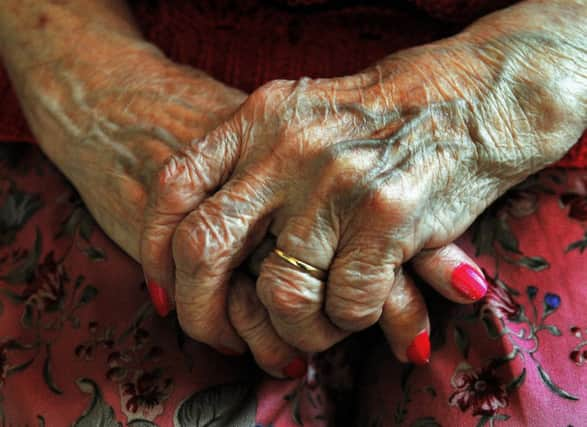Too many people are denied the right to die at home, say charities


Figures from the latest Office for National Statistics survey of bereaved people found that 85 per cent of those who died in hospital in 2013 had expressed a desire to die at home.
Marie Curie, which provides care and support to those with terminal illness, said people are being denied the chance to die where they would prefer because of a number of factors including a lack of 24/7 community support, poor co-ordination between services and the failure to provide fast and free social care support for people at the end of life.
Advertisement
Hide AdAdvertisement
Hide AdBut the charity stressed that there is major scope for efficiency savings by supporting those who want to spend their final days at home to do so.
With access to high-quality nursing care in the community, total care costs could be as much as £500 lower per person.
All the main political parties have made some kind of commitment to improve choice at the end of life and to support more people to die at home, but Marie Curie – representing a coalition of other charities – said whoever comes to power needs to set out how they will do this.
It added that it estimated 1.4m people could die in hospital over the course of the next parliament when their preference was to die at home.
Advertisement
Hide AdAdvertisement
Hide AdThis would mean people at the end of life would continue to occupy beds unnecessarily and put further pressures on hard-pressed A&E units.
Half of 550,000 UK deaths occur in hospital each year.
The chief executive of Marie Curie, Jane Collins, said: “It’s time to change the way we care for people with a terminal illness.
“Fewer than five per cent of people say they want to be in hospital at the end of their lives, yet around 50 per cent of people who die do so in hospital, often with no clinical need to be there.
“Pressure is increasing on NHS budgets and A&E departments are already over-stretched.
Advertisement
Hide AdAdvertisement
Hide Ad“The evidence shows that it makes financial sense for the NHS to support people to be cared for at home in their last weeks and days.
“This is also what the majority of people with a terminal illness would prefer.
“Together, we are calling on all parties and the next government to set out how they will introduce fast and free social care for everyone nearing the end of their lives to reduce pressure on hospitals and deliver genuine choice.”
Marie Curie has been working in partnership with a coalition of charities who support people at the end of their lives including Cicely Saunders International, Hospice UK, Macmillan Cancer Support, the Motor Neurone Disease Association, the National Council for Palliative Care and Sue Ryder.
Advertisement
Hide AdAdvertisement
Hide AdMeanwhile, new research published today has claimed that patients who have persistently swollen neck glands should be referred for specialist investigation as the symptom could indicate cancer.
A team of scientists, led by Exeter University medical school, say such referrals could help to avoid some of the 5,000 deaths each year from lymphoma.
They say earlier diagnosis is key - currently more than 40 per cent of patients visit their GP with symptoms at least three times before being referred for investigations.
Two studies concluded persistently swollen neck glands could indicate a high risk of this type of cancer.